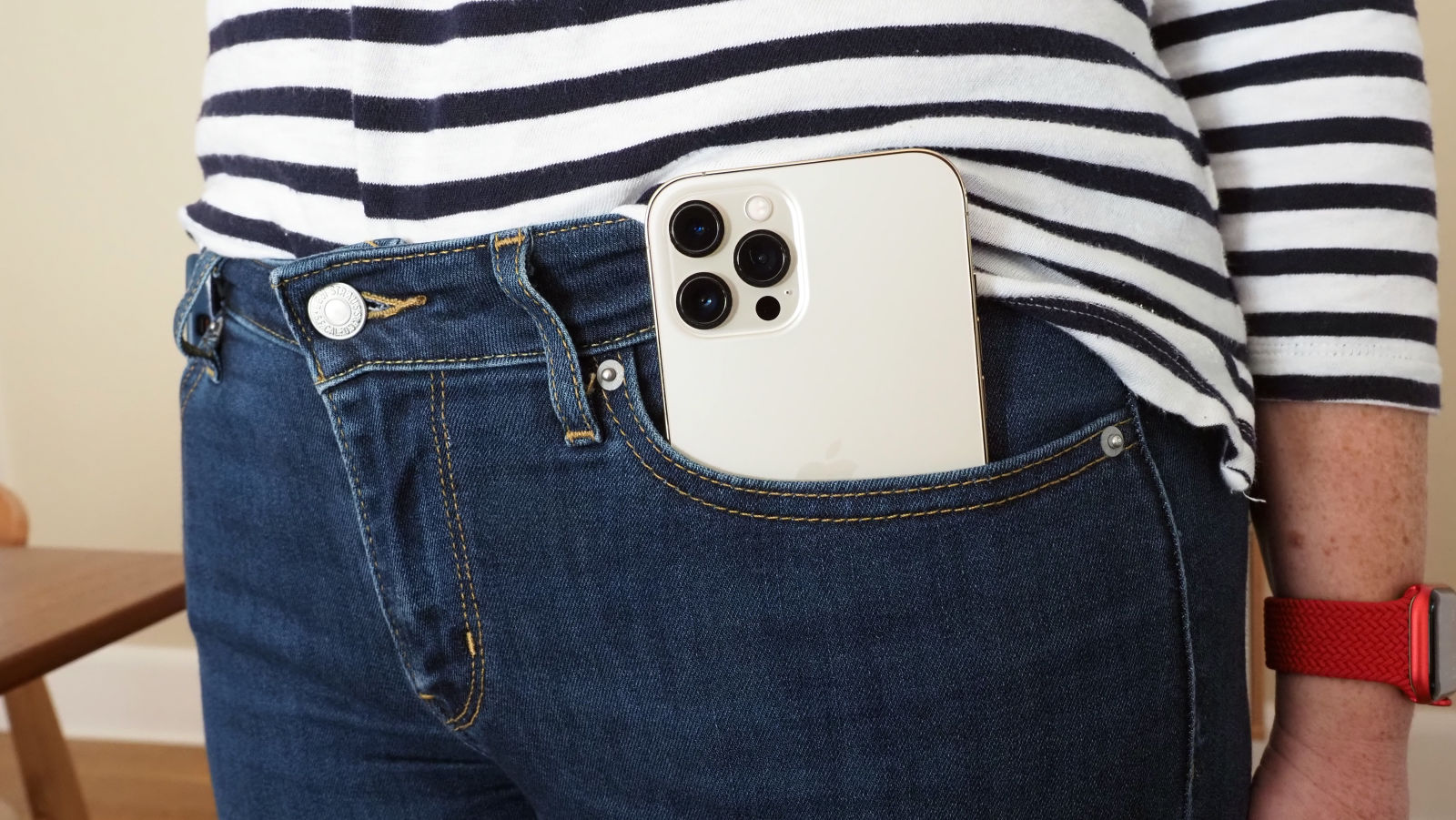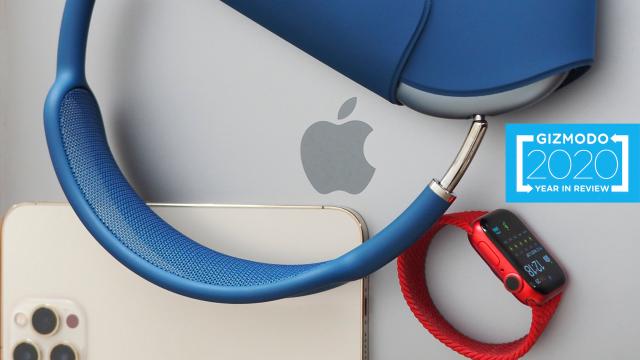While most of us were having a horrible year, with lives and jobs up-ended by the global pandemic, tech companies sailed through 2020, buoyed by a stock market completely divorced from reality and consumers in need of products and software to do work and school at home. Apple was one such company, breaking its own revenue record for the year ($US274.5 ($361) billion) and becoming the first American company to hit a $US2 ($3) trillion market cap. Forbes named the company the most valuable in the world for 2020, and according to Bloomberg, Apple was the “best performer among the largest technology stocks” this year. The company could’ve coasted on the fact that many of its products, like Macs and iPads, have become essential for people working and schooling at home and simply cashed its checks. But 2020 was also a game-changer for the company’s products: a year in which it consolidated its Mac stack in-house, built out its services, made its cheaper products better than ever, and rounded out its lineup of core devices with accessories people actually want.
That’s not to say 2020 was a complete success. Apple also found itself in a legal tussle with Epic Games over its App Store commission, in the crosshairs of regulators due to antitrust allegations, and in a fight with Facebook over new privacy policies in iOS.
Here are Apple’s biggest hits and most cringeworthy moments of 2020.
So, So Many Products
While the rest of us were hanging on by a thread, trying to make sense of a senseless pandemic, Apple adapted to 2020 with aplomb. In-person events cancelled? No problem; pre-record and stream product launches for everyone to watch. Retail stores closed? That’s OK; online shopping is a way of life now. Supply chain disruptions? Hell, those just contributed to the iPhone 12 hype even as they pushed the lineup’s launch back and caused the company to take a revenue hit in Q4. (We won’t know how many iPhones 12 Apple sold until its Q1 earnings report in January.)
But Apple began the year with a trickle of announcements. We saw a new Intel MacBook Pro with redesigned keyboard at long last, a cheap second-gen iPhone SE, and a new iPad Pro that finally felt like the laptop replacement we could get down with, thanks to the Magic Keyboard.
Things really got rolling in June. WWDC brought the major announcement that Apple would officially be moving its Macs to a custom-designed processor with integrated graphics.
And from there there was a new launch seemingly every month, beginning in August with the 27-inch iMac. The September event, unlike years past, didn’t see new iPhones — instead we got the Apple Watch Series 6 and Watch SE, as well as a fourth-gen iPad Air and 8th-gen iPad. October delivered a quartet of iPhones 12 — a long-awaited Mini model, a competitively priced iPhone 12, a stunning 12 Pro, and ridiculously oversized but incredible 12 Pro Max. Apple’s first 5G iPhones not only connect to fledgling 5G networks, they also sport a new version of Apple’s magnetic charging technology, MagSafe. The company also debuted two new MagSafe chargers and a suite of MagSafe accessories, though the latter have been less than impressive so far.

But that’s not all: In November we got the M1 Macs previewed at WWDC: a MacBook Pro, MacBook Air, and Mac Mini that have processing power that rival much pricier PC rivals.
And of course, this fall saw the launches of iOS 14, watchOS 7, and macOS Big Sur, which delivered the biggest changes for most people. Big Sur heralded the iOS-ification of the Mac even as Apple resists touchscreen laptops, and iOS 14 brought home screen widgets and customisation options people have been waiting for for years.
And who could forget that this month alone brought the wildly priced AirPods Max and the launch of Apple’s Peloton rival streaming service, Fitness+.
Whew. Looking at that list is…a lot. Apple didn’t have any huge misses product-wise, though the iPhone 12 Mini’s battery life was disappointing for those of us who want more from a small phone, and did we mention AirPods Max’s $US550 ($722) price tag?
Apple’s 2020 highlight reel is better than most, but that’s not to say the company’s year was a complete walk in the park.
The Drama
Resentment toward Apple over its walled garden has been building for years, particularly due to the App Store commission it takes from developers for paid apps and in-app subscriptions. The only way to install an app on an iPhone or iPad is via the iOS App Store, which is at the heart of the issue. That tension reached its peak this summer after months of discontent, with Fortnite developer Epic Games laying a trap for Apple to spur a lawsuit over the company’s App Store policies.
Essentially, Epic tried to bypass Apple’s in-app commission by allowing Fortnite players to purchase game currency directly from Epic. The whole thing was clearly a strategy designed to bring Apple to court — which was apparent from Epic’s prepared filing and accompanying video — and it worked. The suit is currently winding its way through the system, with Apple CEO Tim Cook volunteering to be deposed sometime in 2021 and a trial expected to get underway in July.
Apple is also being investigated by regulators in the European Union and criticised by U.S. lawmakers over antitrust allegations. The company attempted to head off those accusations with a new App Store commission policy that reduces the cut it takes from smaller developers, but we’re betting that won’t curb the scrutiny. It’s unclear if lawmakers in either the U.S. or overseas will go so far to break up Apple (or any of the other big tech companies also being targeted by antitrust investigations), or if the fate of the App Store will be determined by the Epic Games lawsuit, but either way, next year will be an interesting one.
Outside of the courts, Apple is also embroiled in a fight with Facebook — but this one makes Apple look like the patron saint of privacy. Apple plans to roll out an iOS feature next year that tells you when companies are tracking you outside of their sites or apps, and then lets you put a stop to it. Facebook is pissed, because that’s the crux of its business: hoovering up data about your web activities and letting advertisers target you based on that activity. If Apple’s privacy-protecting features end up hurting Facebook next year, well, we won’t be sorry to see it.
Up Next
Which brings us to 2021. Aside from the usual product launches, like the iPhone 13 and new generations of iPads and Apple Watches, we’ll almost certainly see more M1 (or perhaps M2) Macs that further showcase Apple Silicon’s processing power.
And then there are the long-rumoured products that we’re all dying to see (if they even exist). The augmented reality glasses we’ve been hearing about for years likely won’t appear until 2022, though we may see hints of Apple’s AR efforts in existing products like the iPhone and iPad next year. And as for the Apple Car rumours that just won’t die…well, we’ll believe it when we see it (and we definitely won’t see it next year).
What are your 2021 predictions for Apple? Drop ‘em in the comments so we can revisit them next year and praise you for your foresight.
